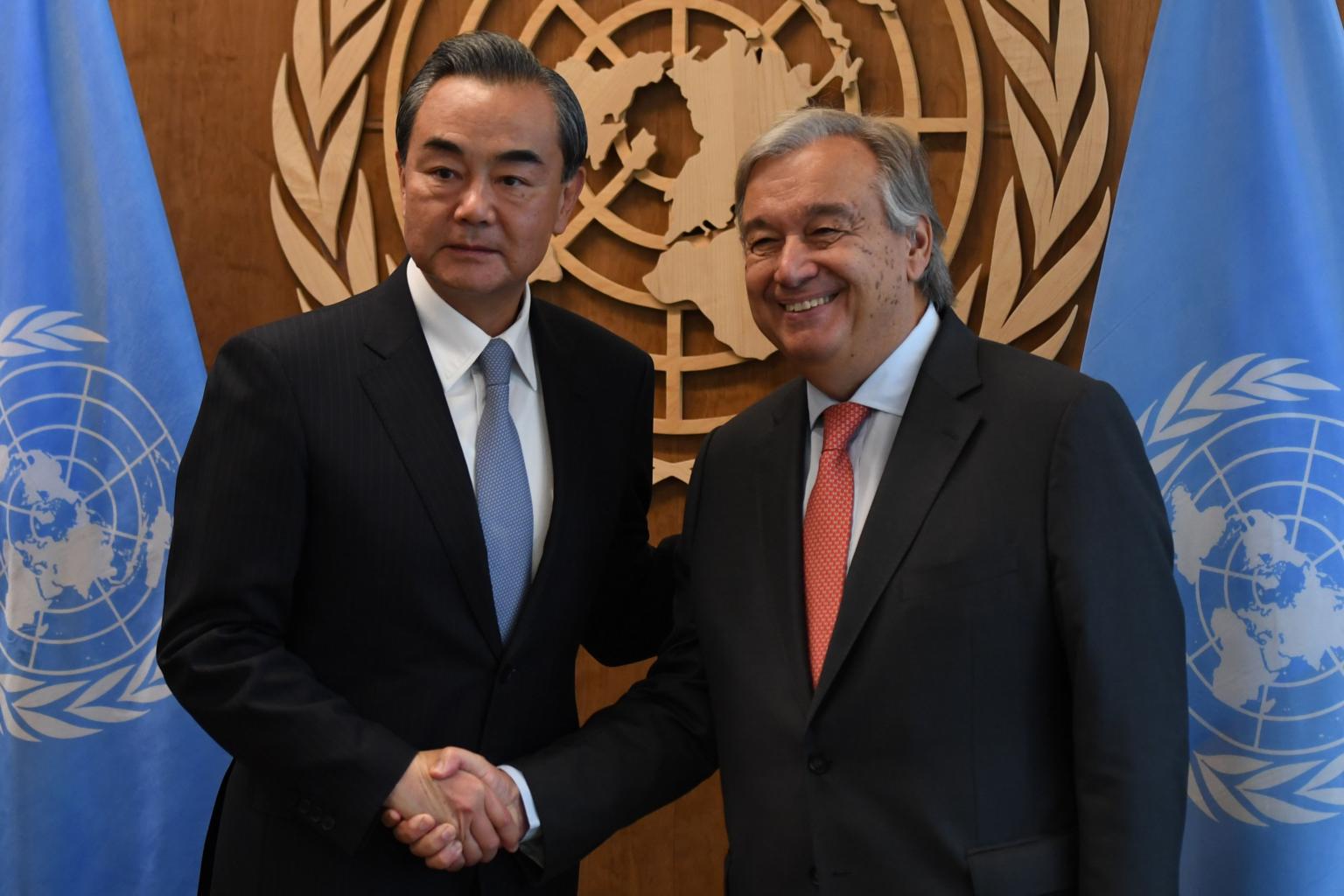China calls for 'understanding' of Myanmar's efforts to protect social stability in Rakhine state
Sign up now: Get insights on Asia's fast-moving developments

United Nations Secretary General Antonio Guterres (right) met with Mr Wang Yi, China's Minister for Foreign Affairs, on Sept 18, 2017, at the United Nations in New York.
PHOTO: AFP
Follow topic:
BEIJING (Reuters) - Chinese Foreign Minister Wang Yi told his Indonesian counterpart there should be understanding of the Myanmar government's efforts to protect social stability and that "violent incidents" in Rakhine state are unacceptable, state media said.
The two met on the sidelines of a United Nations meeting on Tuesday, state news agency Xinhua said on Wednesday.
Earlier, Wang told UN chief António Guterres in New York that China supports Myanmar government's efforts to protect national security and opposes recent attacks mounted by insurgents in the stifle-torn region in Rakhine.
Guterres told the General Assembly: "The authorities in Myanmar must end the military operations, allow unhindered humanitarian access and recognise the right of refugees to return in safety and dignity; and they must also address the grievances of the Rohingya, whose status has been left unresolved for far too long."
A European Union spokeswoman said Myanmar leader Aung San Suu Kyi's invitation to the diplomatic corps to visit Rakhine was "a step forward", but added: "Myanmar's leadership needs to show that the democracy they fought so hard for can work for all the people of Myanmar, beyond ethnic, social and religious boundaries.
Suu Kyi on Tuesday condemned rights abuses in Rakhine state and said violators would be punished, but she did not address UN accusations of ethnic cleansing.
It was the first time she addressed the nation on the Rohingya crisis since attacks by Rohingya Muslim insurgents on Aug 25 led to a military response that has forced 421,000 Rohingya Muslims, more than half of them children, into neighbouring Bangladesh.
Western diplomats and aid officials, hoping for an unequivocal condemnation of violence and hate speech, welcomed the tone of the Nobel Peace laureate's message, but some doubted if she had done enough to deflect global criticism.
Long feted in the West as a champion of democracy in the Buddhist-majority country during years of military rule and house arrest, Suu Kyi has faced growing criticism for saying little about abuses faced by the Rohingya.
"We condemn all human rights violations and unlawful violence. We are committed to the restoration of peace and stability and rule of law throughout the state," Suu Kyi said in her address on Tuesday in the capital, Naypyitaw.
"Action will be taken against all people, regardless of their religion, race and political position, who go against the law of the land and violate human rights," she said.
In a phone call to Suu Kyi, US Secretary of State Rex Tillerson welcomed the Myanmar government's commitment to allow the return of refugees, but urged it to facilitate humanitarian aid to those affected by the violence and to address "deeply troubling" human rights abuse allegations, the US State Department said.
Britain said it had suspended its military training programme in Myanmar and French President Emmanuel Macron condemned "unacceptable ethnic cleaning".
He told the annual UN General Assembly he would start a UN Security Council initiative to ensure humanitarian access and an end to the violence.
Rights monitors and fleeing Rohingya say the army and Rakhine Buddhist vigilantes have mounted a campaign of arson aimed at driving out the Muslim population. The UN rights agency said it was "a textbook example of ethnic cleansing".
Myanmar rejects the charge, saying its forces are tackling insurgents of the Arakan Rohingya Salvation Army who it has accused of setting the fires and attacking civilians.

